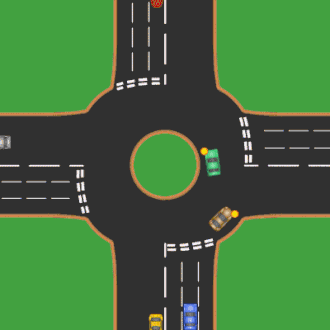Roundabout





Roundabouts are a type of circular intersection or junction in which road traffic flows almost continuously in one direction around a central island. The modern roundabout is designed to improve traffic flow and safety by reducing speeds and the number of points at which drivers must yield. Unlike traditional intersections, which use traffic signals or stop signs to control the flow of traffic, roundabouts rely on the yielding at entry principle, where entering traffic must yield to circulating traffic.
History[edit]
The concept of the roundabout dates back to the early 20th century, with the first circular junction being built in New York City in 1905 at Columbus Circle. However, the modern roundabout, with its yield-at-entry rule, was developed in the United Kingdom during the 1960s. The design was further refined to improve safety and efficiency, leading to the widespread adoption of roundabouts in many countries.
Design and Operation[edit]
A roundabout consists of a central island, usually circular in shape, and one or more entering and exiting roads. The central island may be landscaped, paved, or contain public art. The design features that distinguish modern roundabouts from older circular junction designs include:
- Deflection - The paths of entering vehicles are curved in a manner that promotes reduced speeds.
- Yield at Entry - Drivers entering the roundabout must yield to traffic already circulating within the roundabout, which has the right of way.
- Flared Entries - Multiple lanes at the entrance allow for higher capacity and facilitate easier entry into the roundabout.
Safety[edit]
Studies have shown that roundabouts can significantly reduce the incidence of accidents and fatalities when compared to traditional intersections. This is largely due to the lower speeds and the reduction in conflict points; roundabouts eliminate the possibility of head-on and right-angle (T-bone) collisions. Pedestrian safety is also enhanced in roundabout designs that include well-marked crosswalks and pedestrian refuge islands.
Efficiency[edit]
Roundabouts can improve traffic flow and reduce delays by allowing continuous movement of vehicles. Unlike intersections with traffic signals, where the flow is interrupted by red lights, roundabouts keep traffic moving, which can lead to improved fuel efficiency and reduced emissions from idling vehicles.
Types of Roundabouts[edit]
There are several types of roundabouts, including:
- Mini-Roundabouts - Small in size, with a painted or slightly raised central island. Suitable for areas with low traffic volumes.
- Single-Lane Roundabouts - Have a single circulating lane around the central island. Most common type of roundabout.
- Multi-Lane Roundabouts - Feature two or more circulating lanes and are used in areas with higher traffic volumes.
- Turbo Roundabouts - A more recent innovation with spiraled traffic lanes to increase capacity and safety by reducing lane changing within the roundabout.
Challenges and Criticisms[edit]
While roundabouts offer many benefits, they are not without their challenges and criticisms. Some drivers find roundabouts confusing, especially in regions where they are not common. Multi-lane roundabouts can be particularly challenging for both drivers and pedestrians. Additionally, the construction of roundabouts requires more space than traditional intersections, which can be a limitation in densely built-up areas.
Conclusion[edit]
Roundabouts are an effective solution for managing intersection safety and traffic flow. Their adoption continues to grow as more communities recognize the benefits of reduced accident rates, lower vehicle emissions, and improved traffic efficiency. As drivers become more familiar with roundabouts, their operation becomes smoother, further enhancing their effectiveness as a traffic management tool.
Ad. Transform your life with W8MD's Budget GLP-1 injections from $75


W8MD offers a medical weight loss program to lose weight in Philadelphia. Our physician-supervised medical weight loss provides:
- Weight loss injections in NYC (generic and brand names):
- Zepbound / Mounjaro, Wegovy / Ozempic, Saxenda
- Most insurances accepted or discounted self-pay rates. We will obtain insurance prior authorizations if needed.
- Generic GLP1 weight loss injections from $75 for the starting dose.
- Also offer prescription weight loss medications including Phentermine, Qsymia, Diethylpropion, Contrave etc.
NYC weight loss doctor appointmentsNYC weight loss doctor appointments
Start your NYC weight loss journey today at our NYC medical weight loss and Philadelphia medical weight loss clinics.
- Call 718-946-5500 to lose weight in NYC or for medical weight loss in Philadelphia 215-676-2334.
- Tags:NYC medical weight loss, Philadelphia lose weight Zepbound NYC, Budget GLP1 weight loss injections, Wegovy Philadelphia, Wegovy NYC, Philadelphia medical weight loss, Brookly weight loss and Wegovy NYC
|
WikiMD's Wellness Encyclopedia |
| Let Food Be Thy Medicine Medicine Thy Food - Hippocrates |
Medical Disclaimer: WikiMD is not a substitute for professional medical advice. The information on WikiMD is provided as an information resource only, may be incorrect, outdated or misleading, and is not to be used or relied on for any diagnostic or treatment purposes. Please consult your health care provider before making any healthcare decisions or for guidance about a specific medical condition. WikiMD expressly disclaims responsibility, and shall have no liability, for any damages, loss, injury, or liability whatsoever suffered as a result of your reliance on the information contained in this site. By visiting this site you agree to the foregoing terms and conditions, which may from time to time be changed or supplemented by WikiMD. If you do not agree to the foregoing terms and conditions, you should not enter or use this site. See full disclaimer.
Credits:Most images are courtesy of Wikimedia commons, and templates, categories Wikipedia, licensed under CC BY SA or similar.
Translate this page: - East Asian
中文,
日本,
한국어,
South Asian
हिन्दी,
தமிழ்,
తెలుగు,
Urdu,
ಕನ್ನಡ,
Southeast Asian
Indonesian,
Vietnamese,
Thai,
မြန်မာဘာသာ,
বাংলা
European
español,
Deutsch,
français,
Greek,
português do Brasil,
polski,
română,
русский,
Nederlands,
norsk,
svenska,
suomi,
Italian
Middle Eastern & African
عربى,
Turkish,
Persian,
Hebrew,
Afrikaans,
isiZulu,
Kiswahili,
Other
Bulgarian,
Hungarian,
Czech,
Swedish,
മലയാളം,
मराठी,
ਪੰਜਾਬੀ,
ગુજરાતી,
Portuguese,
Ukrainian